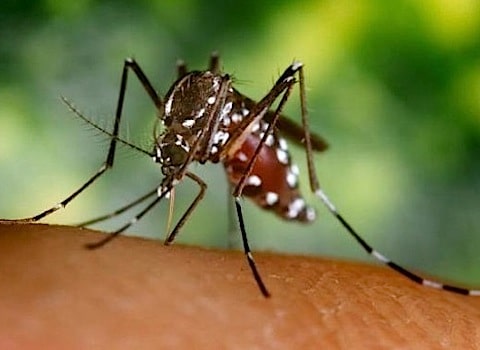With soccer fans returning from Brazil, should we be concerned about a dengue epidemic ? Conveyed by the Tiger Mosquito, the virus has health authorities on the watch over the lack of vaccine or treatment to this day. The mosquito, swift to expand on French territory, is already at home in Isere and the Department has issued a red alert. It was first spotted in 2013, throughout six districts around Grenoble.
 The Tiger mosquito thrives on summer days. Since it was first reported in Menton in 2014, Aedes Albopictus has been on the move and propagated over 18 Departments, among which Isere, set on red alert*, where surveillance activities were reinforced.
At home in Isere since 2011
The little biter was introduced in the Department in 2011 and reported over 5 communes of Isere in 2012. In 2013, one site only was added to the list. Last summer, the Tiger mosquito was roaming around the communes of Saint Martin d’Heres, Corenc, Eybens, Gieres, Meylan and Poisat. One off observations in Grenoble still leave room for doubt.
The Tiger mosquito thrives on summer days. Since it was first reported in Menton in 2014, Aedes Albopictus has been on the move and propagated over 18 Departments, among which Isere, set on red alert*, where surveillance activities were reinforced.
At home in Isere since 2011
The little biter was introduced in the Department in 2011 and reported over 5 communes of Isere in 2012. In 2013, one site only was added to the list. Last summer, the Tiger mosquito was roaming around the communes of Saint Martin d’Heres, Corenc, Eybens, Gieres, Meylan and Poisat. One off observations in Grenoble still leave room for doubt.
Is the bug on the move ? The mosquito could spread even further over the summer. According to the Rhône-Alpes anti-mosquito association, the little bug is gaining territory. “It’s too early to speak of an infestation”, tempers Gilles Besnard, entomologist at the Rhones Alpes EID, “but ever since it reached the Mediterranean coast, the mosquito made headway seeping into the country.” If it wasn’t for the painful sting, Tiger mosquitos are also successful bearers of potentially dangerous viruses, such as the dengue fever or the chikungunya, a lethal threat to already weakened individuals.
If it wasn’t for the painful sting, Tiger mosquitos are also successful bearers of potentially dangerous viruses, such as the dengue fever or the chikungunya, a lethal threat to already weakened individuals.
 And there’s more ! Another virus called Zika has emerged, also transmitted by the Tiger mosquito, according to the Institute for Research and Development (IRD). Zika was identified in 55 000 cases in French Polynesia in 2013.
No treatment, no vaccine
What’s the course of action ? With no treatment or vaccine in sight, we must all fight the bug in the face of a possible epidemic. Health authorities continue to spread the message among the population, largely oblivious to the risks.
And there’s more ! Another virus called Zika has emerged, also transmitted by the Tiger mosquito, according to the Institute for Research and Development (IRD). Zika was identified in 55 000 cases in French Polynesia in 2013.
No treatment, no vaccine
What’s the course of action ? With no treatment or vaccine in sight, we must all fight the bug in the face of a possible epidemic. Health authorities continue to spread the message among the population, largely oblivious to the risks.
 Easy measures can be applied. “We must eliminate any containers where water could stagnate for over a week”, says Gilles Besnard. The Tiger mosquito lays its eggs in ditch water to reproduce. At the Saint-Martin‑d’Heres cemetery, the commune provided sand to fill in all receptacles and avoid rising damp.
The legislation only demands that a referee be designated. Will warnings and individual efforts be enough ? Nothing can prevent a Tiger mosquito from boarding a car and moving further. “We must think broader than the limits of the commune”, says the specialist.
Patricia Cerinsek
Translation by Cécile Boussier
* On May 1st 2014, Public Authorities activated the defense system against the dissemination of the dengue fever and the chikungunya throughout the country, resulting in increased entomologic and epidemiologic surveillance.
** The tiger mosquito is the sole bearer of the virus. There’s no risk of contamination by human beings.
Easy measures can be applied. “We must eliminate any containers where water could stagnate for over a week”, says Gilles Besnard. The Tiger mosquito lays its eggs in ditch water to reproduce. At the Saint-Martin‑d’Heres cemetery, the commune provided sand to fill in all receptacles and avoid rising damp.
The legislation only demands that a referee be designated. Will warnings and individual efforts be enough ? Nothing can prevent a Tiger mosquito from boarding a car and moving further. “We must think broader than the limits of the commune”, says the specialist.
Patricia Cerinsek
Translation by Cécile Boussier
* On May 1st 2014, Public Authorities activated the defense system against the dissemination of the dengue fever and the chikungunya throughout the country, resulting in increased entomologic and epidemiologic surveillance.
** The tiger mosquito is the sole bearer of the virus. There’s no risk of contamination by human beings.

DR A female tiger mosquito filled with blood
Is the bug on the move ? The mosquito could spread even further over the summer. According to the Rhône-Alpes anti-mosquito association, the little bug is gaining territory. “It’s too early to speak of an infestation”, tempers Gilles Besnard, entomologist at the Rhones Alpes EID, “but ever since it reached the Mediterranean coast, the mosquito made headway seeping into the country.”

Sporadic reports of Tiger mosquitos / Tiger mosquitos identified and active © ARS
9 cases of dengue fever in 2013
There was no report of any chikungunya in the Department in 2013, however, surveillance remains a high priority. The disease infected 200 000 people in the French Caribbean between 2005 and 2006, killing 93. The propagation continues with 17 400 cases diagnosed, as reported in national newspaper Le Monde. The dengue virus is a greater concern. Last year, the Rhône-Alpes office for health watch (CIRE) counted 9 cases. All were imported from infected territories such as Martinique, Guadeloupe and Guyana, but no contamination in France. Today, the risk of massive introduction in France is increased and favored by a dengue epidemic in Brazil, with over 450 000 people contaminated and 106 killed since the beginning of 2014.Dengue, Chikunkunya and Zika
Upon returning home, could the 17 000 French soccer supporters be bearing the virus ? ** “We have expressed some concerns about a swift raise of the number of cases” doctor Besnard confirms.
Microscopic view of a female Tiger mosquito

Gilles Besnard, entomologist at the EID Rhones Alpes on campus, where he set up Tiger mosquito traps. © Patricia Cerinsek















